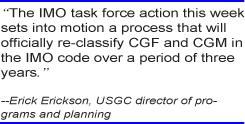This week, a key working group of the International Maritime Organization (IMO) has recommended approval of a U.S. proposal that corn gluten feed (CGF) and corn gluten meal (CGM) be reclassified as ‘seedcake – non-hazardous’ in the official code of the IMO. The reclassification will eliminate a requirement that these cargoes be loaded on vessels with specialized fire suppression equipment.
The proposal was based on the results of tests organized by the U.S. Grains Council in cooperation with a number of U.S. producers, marketers and shippers of CGF and CGM.
“For corn gluten to be loaded with these specifications, it would have significantly raised the cost of exporting U.S. CGF and CGM,” said Erick Erickson, USGC director of programs and planning. “This would reduce the attractiveness of these products to feed manufacturers.”
In 2010, the U.S. Grains Council organized an industry group to address this problem. With samples donated by various shoppers, the Council arranged for combustibility testing at several U.S. labs. Based on the outcome of those tests, the U.S. Coast Guard issued a letter of exemption in December 2010, allowing CGF and CGM to be loaded in U.S. ports as ‘low fire risk’ cargoes.
“The exemption letter only extends to the limits of U.S. Coast Guard jurisdiction and is not binding on non-U.S. ship owners and arrival ports,” Erickson said. “The IMO task force action this week sets into motion a process that will officially re-classify CGF and CGM in the IMO code over a period of three years. In the meantime, the U.S. Coast Guard exemption letter and public knowledge of the IMO decision will facilitate the continued competitiveness of U.S. CGF and CGM in export markets.”
Next Steps
The recommendation of the Editorial and Technical Group will be presented to the Carriage of Dangerous Goods, Solid Cargoes and Containers (DSC) Subcommittee in September 2012. That subcommittee is expected to accept the recommendation, which then must be ratified by the Maritime Safety Committee (MSC) in May 2013. Following MSC approval the new classification will be published in the 2014 edition of the IMSBC code and will be ‘voluntary’ beginning January 2014. The new classification will become mandatory on January 1, 2015.


